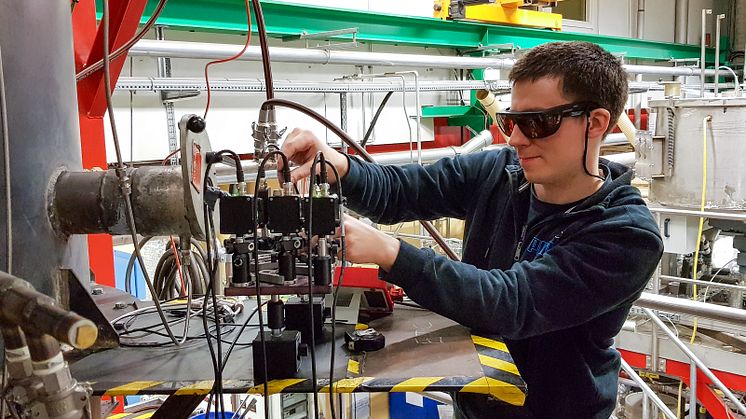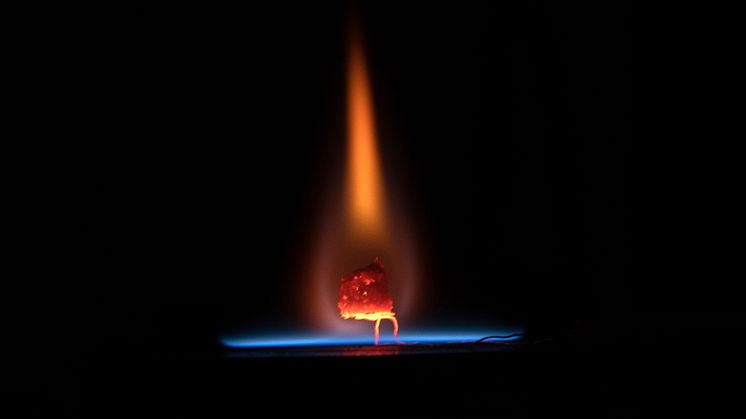
Press release -
Laser spectroscopy for more efficient biomass combustion
Emil Thorin from Umeå University has developed a new optical method for rapid measurements of gaseous inorganic species in biomass combustion and gasification. The new technology will contribute to more efficient conversion of biomass into renewable energy.
Thermal conversion processes, such as combustion and gasification, are used worldwide to generate heat, electricity and chemicals. In the quest for a renewable, circular energy system with a reduced carbon footprint, agricultural and forestry rest products are a promising alternative to fossil fuels. But one of the challenges with biomass is the high content and subsequent release of inorganic species, for example potassium, which leads to operational problems and expensive plant shutdowns.
To overcome this challenge, Emil Thorin, a doctoral student at the Department of Applied Physics and Electronics, developed a versatile technique that can be used to detect the most important potassium compounds simultaneously and directly in the high-temperature process under different experimental conditions.
“For example, in small flames in our laboratory, but also in larger reactors of several meters in length that are representative of industrial facilities. The novel technique is currently the fastest and most sensitive method for quantification of gaseous potassium species and has provided unique experimental data”, says Emil Thorin.
The new technique uses laser spectroscopy and can provide insight into the reactions involving potassium compounds on a nanosecond time scale.
“We hope that our work will contribute to a deeper understanding of thermal biomass conversion and lead to improved numerical models, process monitoring and control. This will increase fuel flexibility and promote more sustainable energy production”, says Emil Thorin.
Emil Thorin’s research shows that combustion is relatively well understood, whereas more work is needed regarding the gasification process, where the supply of oxygen is limited. The research has also shown that the method can be used to quantitatively image the potassium compounds in flames, which can lead to better insight into the reactions.
Emil Thorin's work paves the way for more sustainable and efficient conversion of biomass to renewable energy, while providing increased knowledge of complex chemical processes.
Emil Thorin grew up in Nordmaling and Umeå, Sweden. He holds a Master of Science degree in Engineering Physics from Umeå University.
About the thesis defense
On Thursday 25 May Emil Thorin, Department of Applied Physics and Electronics, Umeå University, defends his thesis entitled Quantitative laser diagnostics of gas-phase potassium species in biomass combustion and gasification. The defense will take place at 09:00 am in room KBE301 (Lilla hörsalen) in the KBC building, Umeå University. The faculty opponent is Professor Zhongshan Li, Division of Combustion Physics, Department of Physics, Lund University.
For more information please contact:
Emil Thorin, Department of Applied Physics and Electronics, Umeå University
Phone: +46 76 696 17 76
E-mail: emil.thorin@umu.se
Topics
Categories
Umeå University
Umeå University is one of Sweden’s largest institutions of higher education with over 37,000 students and 4,300 faculty and staff. The university is home to a wide range of high-quality education programmes and world-class research in a number of fields. Umeå University was also where the revolutionary gene-editing tool CRISPR-Cas9 was discovered that has been awarded the Nobel Prize in Chemistry.
At Umeå University, distances are short. The university's unified campus encourages academic meetings, an exchange of ideas and interdisciplinary co-operation, and promotes a dynamic and open culture in which students and staff rejoice in the success of others.




